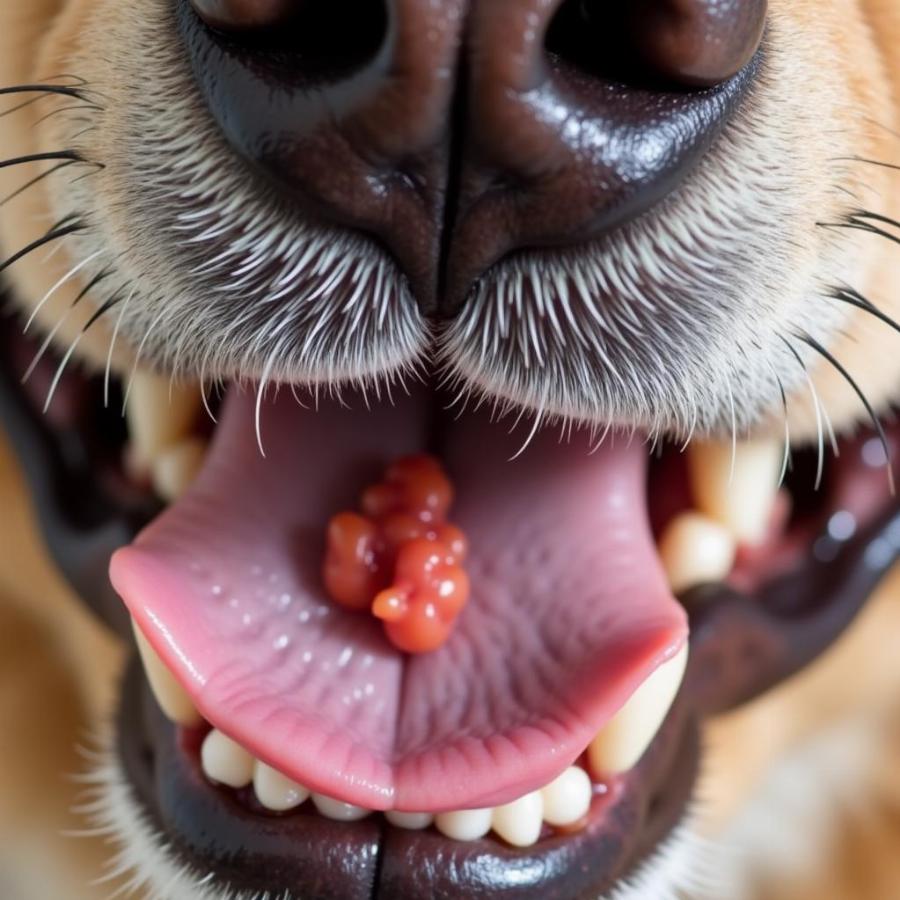The search for “dog mouth cancer photos” often stems from a place of concern and a desire to understand potential health issues in our canine companions. This article will delve into the different types of oral tumors in dogs, what those growths might look like, and the importance of seeking veterinary attention. We will explore the visual aspects of dog mouth cancer, including images that illustrate common symptoms.
Recognizing Potential Signs of Oral Cancer in Dogs
 Hình ảnh khối u ung thư miệng chó
Hình ảnh khối u ung thư miệng chó
Changes in your dog’s mouth can be subtle, so regular checks are vital. While finding a growth in your dog’s mouth can be alarming, it’s essential to remember not all growths are cancerous. However, any new lump, bump, or discoloration warrants a veterinary examination. Some common signs to watch for include unusual growths in the mouth, bleeding from the gums, bad breath, difficulty eating, and swelling around the jaw. Early detection is crucial for effective treatment.
Types of Oral Tumors in Dogs and Their Appearance
Several types of tumors can develop in a dog’s mouth, each with distinct characteristics. Melanomas, often darkly pigmented, are aggressive and can spread rapidly. Squamous cell carcinomas, the most common type of oral cancer in dogs, appear as ulcerated or cauliflower-like growths. Fibrosarcomas can present as firm, fleshy masses. Epulides, on the other hand, are benign growths that arise from the gum tissue. It’s important to note that visually identifying the type of tumor is impossible, and a biopsy is necessary for accurate diagnosis.
What to Do If You Find a Suspicious Growth
If you discover a growth or any other concerning changes in your dog’s mouth, consult your veterinarian immediately. They will perform a thorough oral examination and may recommend further diagnostic tests, such as a biopsy, to determine the nature of the growth. Early diagnosis is essential for increasing the chances of successful treatment.
Treatment Options for Dog Mouth Cancer
Treatment options vary depending on the type and stage of the cancer. Surgery is often the primary treatment for localized tumors. Radiation therapy and chemotherapy may be used alone or in conjunction with surgery. Your veterinarian will discuss the best course of action based on your dog’s specific situation. dog mouth epulis can sometimes be mistaken for cancerous growths.
Importance of Regular Oral Hygiene
Just like in humans, regular oral hygiene can contribute to overall health in dogs. Brushing your dog’s teeth regularly, providing appropriate chew toys, and scheduling professional dental cleanings can help prevent dental disease and potentially aid in early detection of oral abnormalities. growth in dogs mouth should always be checked by a vet.
Conclusion
Finding a suspicious growth in your dog’s mouth can be frightening, but understanding the potential signs and seeking prompt veterinary care are crucial. While “dog mouth cancer photos” can provide visual context, only a veterinarian can diagnose and recommend appropriate treatment. Regular oral hygiene and checkups can contribute to your dog’s overall health and well-being.
FAQ
- Are all growths in a dog’s mouth cancerous? No, not all growths are cancerous. However, any new or unusual growth should be evaluated by a veterinarian.
- What is the most common type of oral cancer in dogs? Squamous cell carcinoma is the most common type.
- Can dog mouth cancer be cured? The prognosis depends on various factors, including the type, stage, and location of the cancer. Early detection and treatment are essential for the best possible outcome.
- How can I prevent oral cancer in my dog? While you can’t entirely prevent cancer, maintaining good oral hygiene and regular veterinary checkups can help with early detection.
- What are the signs of oral cancer in dogs? Signs can include growths, bleeding gums, bad breath, difficulty eating, and facial swelling.
- Is a biopsy necessary for diagnosing oral cancer? Yes, a biopsy is typically required to confirm a diagnosis of oral cancer.
- What are the treatment options for dog mouth cancer? Treatment options may include surgery, radiation therapy, and chemotherapy.
Beaut Dogs
Beaut Dogs is your comprehensive resource for everything related to dog care, offering expert advice on breeds, health, nutrition, training, and more. At Beaut Dogs, we’re dedicated to helping you provide the best possible care for your canine companion. https://beautdogs.com When you need expert guidance, contact us at [email protected] (Email address) for detailed and accurate answers.